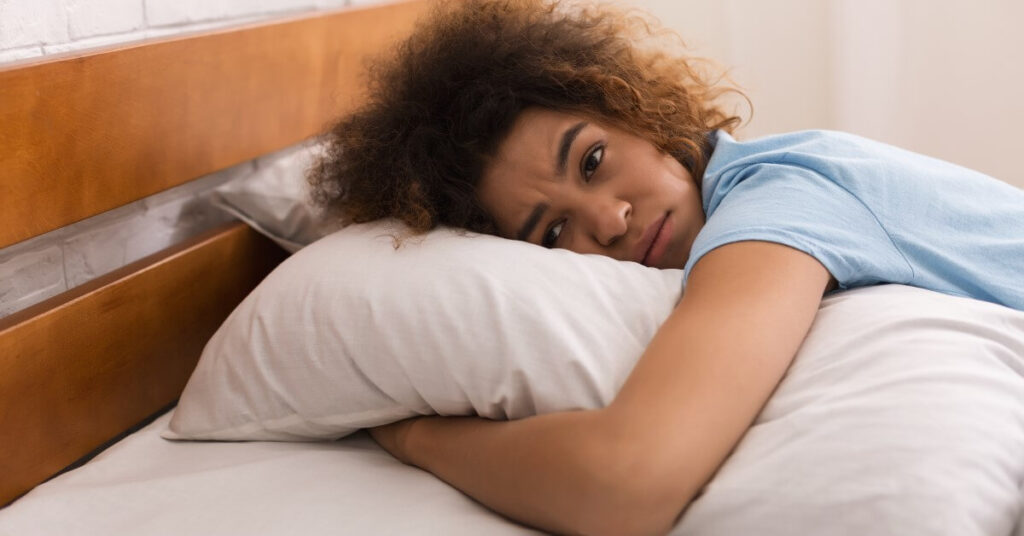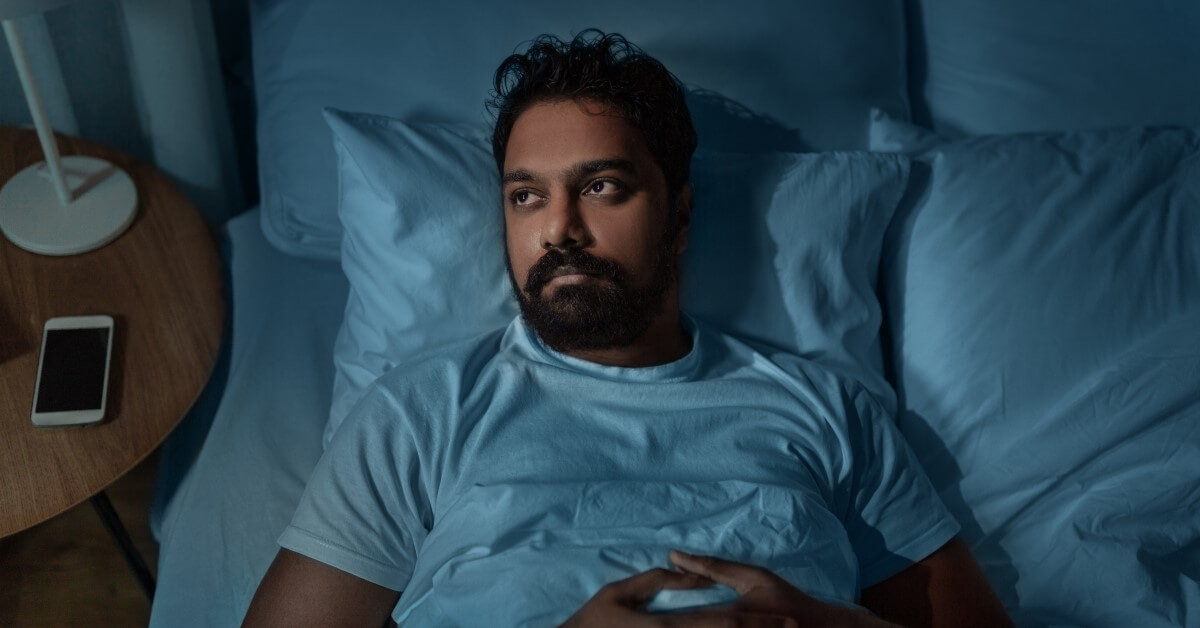
Medically reviewed by
Dacelin St Martin, MD
Triple board-certified in Sleep Medicine,
Internal Medicine, and Pediatrics.
What is Long COVID? | Are Sleep Troubles a Symptom of COVID-19? | What is the Link Between Long COVID and Sleep Problems? | How To Improve Your Sleep If You Have Had COVID-19 | What’s the Takeaway?
Overview
It’s been years since the onset of the COVID-19 worldwide pandemic, but this menacing disease continues to affect many people.
Several studies show that people continue to have lingering COVID symptoms, a condition known as Long/Extended COVID.
Unsurprisingly, some of the most distressing symptoms of this disorder are sleep-related.
In this post, we will look into Long COVID, how it affects sleep, and how those with this problem might improve their sleep.
What is Long COVID?
Long COVID occurs when persons continue experiencing COVID-19 symptoms and fail to completely recover for several weeks or months after the symptoms first appear.
While there is no consensus on the definition of long-term COVID-19, most experts agree that it is when COVID-19 symptoms persist for one to three months or longer.[1]
Evidence suggests that Long COVID is relatively common. Data from a COVID Symptom Study app indicates that one (1) in ten (10) people with the illness experience symptoms for three (3) weeks or longer.[3]
Similarly, data from the United Kingdom’s Office for National Statistics found that roughly 1 in 10 respondents who tested positive for COVID-19 experienced symptoms for 12 weeks or longer.[2] This finding suggests there may be over 5 million cases of long COVID globally.
Are Sleep Troubles a Symptom of COVID-19?
Although sleep issues are not typically identified as cardinal COVID symptoms like cough, fever, or breathlessness, extensive research indicates that around 52 percent of patients with COVID-19 have sleep troubles.
Also, another study found that hospitalized and outpatients experience sleep problems.[4]
Insomnia was the most reported sleep disorder by COVID-19 patients. Colloquially called Coronasomnia, insomnia experienced by COVID patients is frequently characterized by inconsistent bedtimes, trouble falling asleep, poor sleep quality, and daytime tiredness.
What is the Link Between Long COVID and Sleep Problems?
Unfortunately, an increasing amount of data indicates that sleep issues are among the most prevalent symptoms of Long COVID.
In fact, a recent study shows that well over 41 percent of persons with long-term COVID have difficulty sleeping.[5] The research, published in the Journal of General Internal Medicine, included 962 persons treated for long-term COVID-19 from February 2021 to April 2022.[5]
Some critical symptoms described by participants were weariness, respiratory issues, mood change, and, most importantly, difficulty sleeping.
The study’s findings indicated that 59 percent of the patients had minor sleep interruptions, compared to 41 percent who had moderate to severe sleep disruptions.
Also, the researchers noted that people of African descent and persons who had to be admitted to hospitals for COVID-19 treatment were more at risk of having moderate to severe sleep problems.
In addition, patients with anxiety or significant fatigue were observed to be more susceptible to sleep disturbances.
“Our results not only show how important it is to find sleep problems in people who have had long-term COVID because they affect their quality of life, ability to function during the day, and medical health, but they also bring attention to the persistent racial unfairness that was seen throughout the COVID-19 pandemic,” lead-researcher Dr. Cinthya Pena – Orbea, MD, emphasized.
How exactly COVID-19 leads to sleep problems is unclear; however, scientists have hypothesized several ways it can cause these sleep troubles. They include:
- Alterations to the Structure of Sleep: Individuals exposed to COVID-19 may spend fewer hours in deep sleep, which results in a diminished sense of refreshment in both the mind and the body.
- Circadian Rhythm Changes: Some studies suggest that people with Long COVID may have a delayed circadian rhythm, leading to difficulty falling asleep when desired. Typically, the body’s circadian rhythms control when we sleep, how alert we feel, and other processes that occur throughout the day.
- Mental Health Issues: COVID-19 symptoms can have an impact on the way someone feels and their mental health, increasing their risk of chronic sleep problems.
- The Effect of Other COVID Symptoms: Symptoms like difficulty breathing and pain can make falling or staying asleep challenging.
How To Improve Your Sleep If You Have Had COVID-19
COVID-19 recovery can take some time, and sleep issues are common. However, adopting efforts to improve sleep may help prevent these issues from worsening over time.
Additionally, improved sleep boosts your immune system, allowing it to battle infections more efficiently.
Here are some strategies you can adopt to improve your sleep. They include:
- Keep a Sleep Journal: A sleep journal/diary is a tool for documenting information on sleep duration, sleep quality, and the many elements that impact nighttime sleep. This journal can assist you in tracking and optimizing your sleep while also collecting information during an appointment with a doctor, if necessary.
- Plan to Sleep Better: Make a commitment to sleeping seven (7) – eight (8) hours daily. Maintaining a consistent sleep routine without changing bedtime or wake-up timings on weekends or non-working days may be beneficial. It conditions your brain to recognize the set hours as sleep hours, helping you achieve sleep quickly.
- Get Some Exercise Daily: Daily exercise can help people cope better emotionally and psychologically with stress and improve their sleep.[6]
- Get Some Natural Light: Exposure to natural light during the day is one of the main factors contributing to a healthy circadian rhythm. Get at least 30 minutes of sunshine, preferably first thing in the morning, to help you sleep better at night.
- Cut Back on Alcohol and Caffeine Consumption: Avoiding coffee in the late afternoon and evening may help you get a better night’s rest because of its stimulating effects on the body. Alcohol can also diminish the quality of your sleep.
- Maintain a Healthy Sleep Environment: Make your bedroom a restful haven to unwind, get comfortable, and drift off to sleep effortlessly. Typically, this entails lowering ambient light and noise, using a high-quality mattress and pillow, and adjusting the temperature control system to an agreeable level.
What’s the Takeaway?
Adopting these sleep routines should help you get better sleep. However, if your sleep symptoms persist, do not hesitate to consult a sleep doctor or expert who will assess your symptoms and prescribe relevant tests and treatments to improve your sleep.
References:
- Thaweethai, T., Jolley, S. E., Karlson, E. W., Levitan, E. B., Levy, B., McComsey, G. A., McCorkell, L., Nadkarni, G. N., Parthasarathy, S., Singh, U., Walker, T. A., Selvaggi, C. A., Shinnick, D. J., Schulte, C. C. M., Atchley-Challenner, R., Horwitz, L. I., Foulkes, A. S., Aberg, J. A., Adolphi, N. L., … RECOVER Consortium. (2023). Development of a definition of post-acute sequelae of SARS-CoV-2 infection. JAMA: The Journal of the American Medical Association, 329(22), 1934. https://doi.org/10.1001/jama.2023.8823
- The prevalence of long COVID symptoms and COVID-19 complications. (n.d.). Gov.uk. Retrieved January 26, 2024, from https://www.ons.gov.uk/news/statementsandletters/theprevalenceoflongcovidsymptomsandcovid19complications
- University of Liverpool. (n.d.). How long does COVID-19 last? Zoe.com. Retrieved January 26, 2024, from https://health-study.zoe.com/post/covid-long-term?fbclid=IwAR1RxIcmmdL-EFjh_aI-
- Donzella, S. M., Kohler, L. N., Crane, T. E., Jacobs, E. T., Ernst, K. C., Bell, M. L., Catalfamo, C. J., Begay, R., Pogreba-Brown, K., & Farland, L. V. (2022). COVID-19 Infection, the COVID-19 Pandemic, and Changes in Sleep. Frontiers in public health, 9, 795320. https://doi.org/10.3389/fpubh.2021.795320
- Pena-Orbea, C., Lapin, B., Li, Y., Englund, K., Heinzinger, C., Foldvary-Schaefer, N., & Mehra, R. (2023). Sleep disturbance severity and correlates in post-acute sequelae of COVID-19 (PASC). Journal of General Internal Medicine, 38(8), 2015–2017. https://doi.org/10.1007/s11606-023-08187-3
- Antunes, R., & Frontini, R. (2021). Physical activity and mental health in Covid-19 times: an editorial. Sleep medicine, 77, 295–296. https://doi.org/10.1016/j.sleep.2020.10.007

